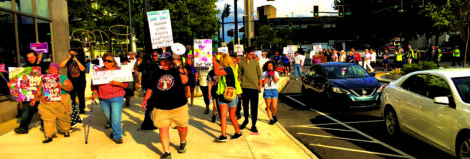City council backs water rate increase
Youngstown faces $10 per month hike
YOUNGSTOWN — City council backs plans to raise the monthly water rate by $10 while reducing the environmental sanitation fee by the same amount, as well as proposals to use about $300,000 from federal and state agencies on COVID-19 expenses.
Council met virtually Monday as its finance committee to discuss the agenda for Wednesday’s full council meeting. Six of council’s seven members attended with Jimmy Hughes, D-3rd Ward, being the only one not to participate. During the 90-minute meeting, no council member objected to any of the proposed legislation for Wednesday’s meeting.
The water-sanitation fund switch, which will take effect July 1, didn’t attract much discussion at Monday’s meeting.
The questions were largely limited to members asking if council has the authority to set the rates — the water rate is determined by the mayor and water commissioner and the sanitation fee is set by council — and the impact this will have on demolitions.
Michael Durkin, code enforcement and blight remediation superintendent, said the street department will continue to do demolitions, but those from contractors involving the abatement of asbestos will decrease.
Water Commissioner Harry L. Johnson III recently disclosed that even with the increase he’s concerned the water fund could end the year with a deficit.
A study of the funds on March 3 determined that despite the change the water fund would end this year with only a $42,000 surplus.
Since then, the COVID-19 pandemic hit and Johnson said the city has more than $1 million in delinquent bills from its customers.
The $10 change, which is only for those who live in the city, will reverse what council did in late 2015 to lower the water rate and increase the sanitation fund by the same amount.
Because of the rate reduction as well as other factors, including using about $5 million in water money for economic development in four years, the water fund went from a $14,428,000 surplus on Jan. 1, 2016, to $2,151,000 as of Dec. 31, 2019.
With the change, the environmental sanitation fund surplus will go from $2,194,000 at the beginning of this year to $923,000 by Dec. 31, and an expected $25,000 deficit by the end of next year.
That also includes the city no longer spending about $2.6 million annually for contractors to do asbestos abatement and demolition beginning in 2022.
COVID FUNDING
Council also discussed funding it will receive for the pandemic.
The police department is getting $139,277 from the U.S. Department of Justice’s Bureau of Justice Assistance.
Most of the money will be used for sanitizing equipment at the department as well as for gloves and masks for officers with some going toward overtime, police Chief Robin Lees said. He couldn’t say Monday how much was being spent on overtime, but said it was a small amount.
The health district is getting two grants from the Ohio Department of Health.
One is $71,395 for COVID-19 contact tracing.
The other is $83,318 for “incident, surge and information management” related to the virus, according to the ordinance.
Health Commissioner Erin Bishop explained Monday that of the latter grant, $29,906 is for administrative costs; $35,000 is for radio and television commercials, ads on social media, yard signs and a mass mailing of COVID-19 information that hasn’t been sent yet; and $20,412 is for personal protective equipment such as gloves and masks.
The city is also receiving a $20,000 grant from Key Bank to help small businesses impacted by the pandemic.
The city was awarded $3.81 million on March 30 from the federal government to provide assistance to businesses and for job training, as well as to help the homeless. The money hasn’t arrived.
The city has outlined its plans for the funds, but is awaiting further guidance from the U.S. Department of Housing and Urban Development as to how it can access and disburse the money to eligible applicants, said Beverly Hosey, the city’s community development agency director.
The city is getting $2,091,689 in Community Development Block Grant funds and $1,720,019 in Emergency Solution Grant money with the latter used exclusively for the homeless.
Council is expected Wednesday to approve legislation to expand a contract with Mullin and Lonergan Associates, a Pittsburgh firm, to help with administrative work related to the CDBG funds.
Mullin started working April 1 for the city to help it with its existing CDBG program at a cost of $33,735 before the additional funds from COVID-19 were awarded.
The proposed contract extension doesn’t have a maximum dollar amount, and instead has hourly fees depending on who is working. The hourly amounts range from $55 for an administrative assistant to $200 for company principals.
Council will also consider Wednesday a contract renewal with Hunter Morrison to serve as the city’s planning consultant.
He was hired for $75 an hour up to $25,000 for a year in August 2019 with an option for a second year under those same dollar amounts.
Instead, council will vote on a $75,000 contract with Morrison for the year, retroactive to Jan. 1. No council member questioned at Monday’s meeting why the administration has kept Morrison for more than five months without paying him.
dskolnick@tribtoday.com




